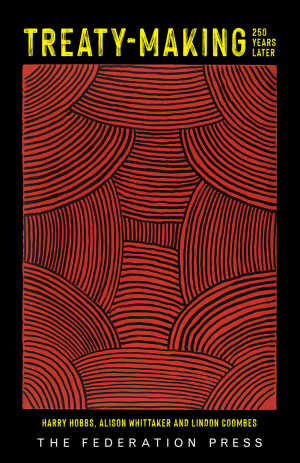This continent was colonised without consent. No treaty was signed at first contact or in the years thereafter. Australia is a nation state on shaky ground, one of few without a treaty with Indigenous people.
However, recently, Victoria, South Australia, the Northern Territory and Queensland have committed to entering treaty processes with the Aboriginal and Torres Strait Islander nations whose lands fall within their borders. This is the first time in Australian history that any government has opened a treaty process. While it is momentous, it is not without its challenges given the historical absence of a treaty.
In this edited collection, Indigenous and non-Indigenous scholars and policy-makers from Australia and New Zealand engage with the legal, historical and political dimensions of treaty-making in Australia. These considered and nuanced contributions provide a roadmap for how to develop a legal artifice and treaty relationship that delivers justice.
Introduction
Harry Hobbs, Alison Whittaker and Lindon Coombes
1. Talking Treaty: A Conversation on how Indigenous Nations can become Treaty Ready
Daryle Rigney, Damein Bell, and Alison Vivian
2. Treaty Making in Australia: The Non-Indigenous Party
Cheryl Saunders
3. Making Black stories matter: Understanding media narratives on treaty and Aboriginal aspirations
Amy Thomas, Andrew Jakubowicz and Heidi Norman
4. Establishing a Neutral Legal Framework for Treaty in Australia
A. J. Wood
5. Rebalancing, Renewing, Re-structuring: Strengthening the Constitution of Aotearoa through a Treaty Relationship
Carwyn Jones
6. Being Self Determining in NSW – Treaty or Not!
Heidi Norman, Janet Hunt and Deirdre Howard-Wagner
7. Treaty Making: Critical Reflection on Critiques from Abroad
Stephen Young and Harry Hobbs
8. The Mess of Colonialism, the Complexity of Treaty
Sarah Maddison, Julia Hurst and Dale Wandin (Wurundjeri)
9. We Dare to Hope: Treaty-Making in Australia
Emeritus Professor Mick Dodson AM
10. The work of the Victorian Treaty Advancement Commission to bring us closer to Treaties in Victoria
Jill Gallagher AO
From Here to There
When I was a teenager, I was walking through some forest with my uncle. It was unfamiliar country and we were not following any track. It was not our country and we were treading carefully. I was walking behind and Uncle was leading. Every now and then he would turn around and look behind us. I asked him if someone was following us. He said ‘no, them old men taught me to keep looking behind so you see what the country will look like on your way back. You remember it then and it makes it easier to find your way back’.
In writing this foreword, I am reminded of that story. We, the people who have been squashed under the heel of the British boots, have been forced out into unknown territory. Territory where our laws are ignored and our spirits ridiculed. Territory where our language has been reduced to a whisper and our ceremony banished.
And we are now looking to find our way back, but such was the speed and brutality of our exit, that we were unable to take our bearings. The things we now see might look familiar but we do not know if we are headed in the right direction.
For some time, I will admit, I envisioned the path of our existence since the arrival of the British as a journey to some new place. That we couldn’t go back to the place we came from, for it no longer exists. But, with age has come the appreciation our future lies in our heartlands.
This book, with its excellent contributions by some of the most significant thought leaders on this topic, might be characterised as providing some bearings for us all. Showing us some markers and milestones where none could be left. Treaties can help us re-trace our steps.
I congratulate the editors on assembling the authors and content, and expect that this book will be an invaluable reference source for many years to come.
Tony McAvoy SC, Wirdi Man
Frederick Jordan Chambers
24 May 2021
Supplementary material for Chapter 9 “We Dare to Hope: Treaty-Making in Australia” by Emeritus Professor Mick Dodson AM
DIAGRAM 4: Proposed treaty-making framework*
This proposed treaty-making framework describes the structures, entities and the mechanisms needed to facilitate a treaty system in the Northern Territory. It proposes the establishment of the following entities:
1. Northern Territory First Nations Treaty Commission (Treaty Commission)
2. Office of First Nations Treaty-Making (Treaty Office)
3. NT First Nations Treaty Tribunal (Treaty Tribunal)
*Northern Territory Treaty Commission, Treaty Discussion Paper (30 June 2020).

DIAGRAM 5: Proposed negotiating model*
This proposed negotiating model describes the process, underpinned by legislation, to be overseen by the Treaty Commission and used by the parties (that is, a First Nation Government and the Northern Territory Government) to negotiate a treaty. The suggested negotiation process aligns with the made-in-BC six-step process. It consists of:
stage 1: Statement of Intent to Negotiate
Stage 2: Readiness to Negotiate
Stage 3: Negotiation of a Framework Agreement
Stage 4: Negotiation of an Agreement in Principle Stage 5: Negotiation to Finalise a Treaty
Stage 6: Implementation of the Treaty
*Northern Territory Treaty Commission, Treaty Discussion Paper (30 June 2020).










